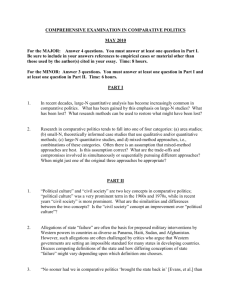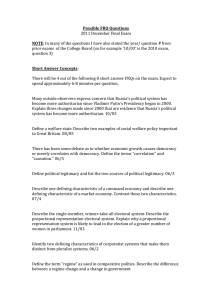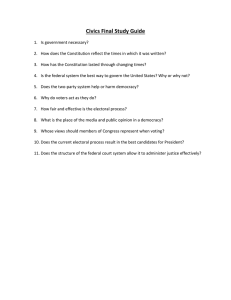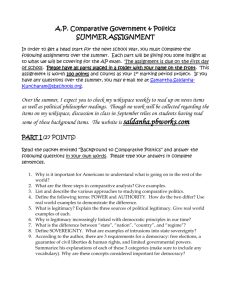AP Comparative Free Response Essays
advertisement
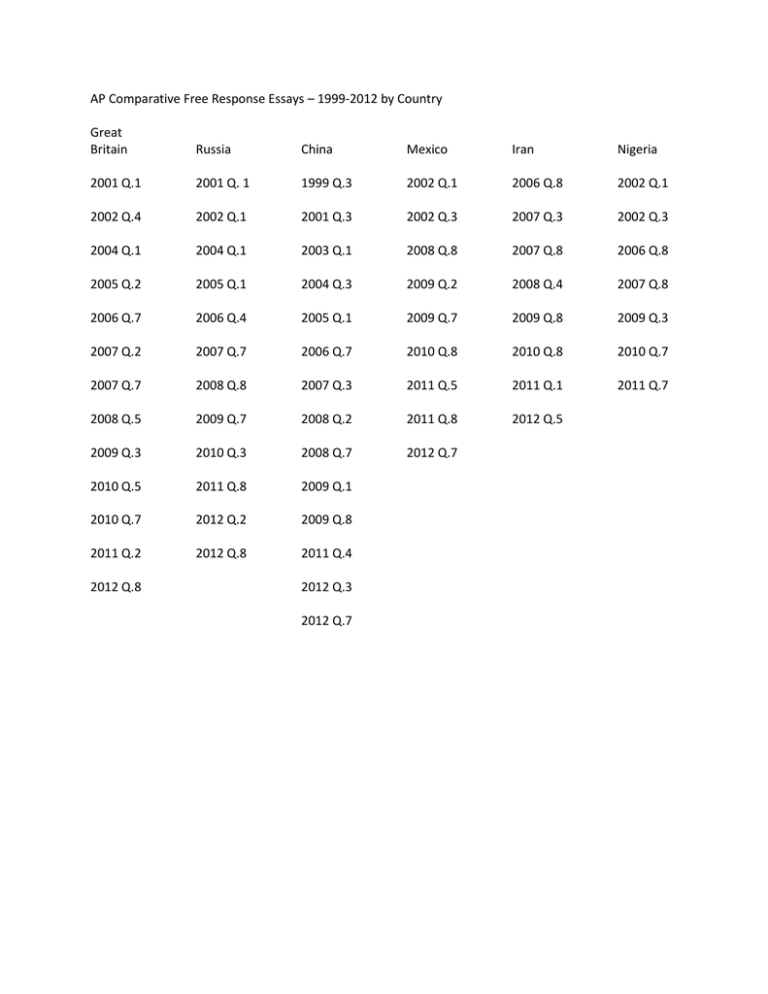
AP Comparative Free Response Essays – 1999-2012 by Country Great Britain Russia China Mexico Iran Nigeria 2001 Q.1 2001 Q. 1 1999 Q.3 2002 Q.1 2006 Q.8 2002 Q.1 2002 Q.4 2002 Q.1 2001 Q.3 2002 Q.3 2007 Q.3 2002 Q.3 2004 Q.1 2004 Q.1 2003 Q.1 2008 Q.8 2007 Q.8 2006 Q.8 2005 Q.2 2005 Q.1 2004 Q.3 2009 Q.2 2008 Q.4 2007 Q.8 2006 Q.7 2006 Q.4 2005 Q.1 2009 Q.7 2009 Q.8 2009 Q.3 2007 Q.2 2007 Q.7 2006 Q.7 2010 Q.8 2010 Q.8 2010 Q.7 2007 Q.7 2008 Q.8 2007 Q.3 2011 Q.5 2011 Q.1 2011 Q.7 2008 Q.5 2009 Q.7 2008 Q.2 2011 Q.8 2012 Q.5 2009 Q.3 2010 Q.3 2008 Q.7 2012 Q.7 2010 Q.5 2011 Q.8 2009 Q.1 2010 Q.7 2012 Q.2 2009 Q.8 2011 Q.2 2012 Q.8 2011 Q.4 2012 Q.8 2012 Q.3 2012 Q.7 *Define illiberal democracy (2006 Q.1) *Define political legitimacy and list two sources of political legitimacy (2006 Q.3) *Identify three functions of political parties common to authoritarian and democratic systems (2007 Q.1) *Describe one defining characteristic of a command economy and describe one defining characteristic of a market economy. Contrast these two characteristics. (2007 Q.4) *Identify three different forms of political participation in authoritarian systems (2007 Q.5) *(a) Define bicameralism. (b) Identify one of the six countries covered in the AP Comparative Government and Politics course that has a bicameral national legislature. (c) Explain why a federal democracy is likely to have a bicameral national legislature. (d) Provide one other reason for a bicameral national legislature. (e) Describe two implications of federalism for the policy-making process. (2007 Q.6) *Define political socialization. Identify one agent of political socialization. Explain how the agent you have identified promotes political socialization. (2008 Q.1) *Define sovereignty. Describe two ways in which member states give up some sovereignty as members of the European Union. (2008 Q.3) *States vary in terms of their party systems and electoral systems. (a) Identify and explain the type of electoral system that tends to create a multiparty system. (b) Identify and explain the type of electoral system that tends to create a two-party system. (c) Describe one reason that a one-party system might emerge. (d) Explain one advantage each of multiparty, two-party and one-party systems in a multiethnic society. (2008 Q.6) *Describe one feature of a bureaucracy in the context of an authoritarian system. Explain how that feature you have described can both help and hinder the effective implementation of public policy in an authoritarian system. (2009 Q.4) *Identify two countries in the AP Comparative Government and Politics course—other than Iran—where religion serves as a source of political legitimacy. Describe how religion confers political legitimacy in each of the two countries that you have identified. (2009 Q.5) *(a) Describe one similarity and one difference between illiberal democracy and liberal democracy. (b) Identify an institution that would need to be changed to make an illiberal democracy more liberal. (c) Describe a change to the institution you identified in (b) that would facilitate a shift from illiberal to liberal democracy. (d) Explain why the change you described in part (c) would lead to a more liberal democracy. (2009 Q.6) *Describe a major difference between federal and unitary systems. Identify one country among the six AP Comparative Government and Politics countries that has a federal system. Identify one country among the six that has a unitary system. (2010 Q.1) *Use the following information to complete the tasks below. SELECTED NATIONAL INDICATORS FOR TWO COUNTRIES Country X Country Y Population 75 million 150 million HDI ranking 43 88 GDP per capita $27,000 $2,500 Percent of workforce in agriculture 4% 37% (a) Identify which country is more economically developed, Country X or Country Y. (b) Select one of the indicators listed in the table and explain how that indicator can be used to support your answer in (a). (c) Select another indicator listed in the table and explain how that indicator can be used to support your answer in (a). (2010 Q.2) *Define a rentier (rent-seeking) state. Identify one rentier state among the six AP Comparative Politics and Government countries. Describe a problem that a rentier state typically faces that has an impact on economic development. (2010 Q.4) *Many scholars think that civil society is important for the development of democracy. (a) Define civil society. (b) Identify and explain one specific condition within a political system that would enable civil society to thrive. (c) Identify and explain another specific condition within a political system that would enable civil society to thrive. (2010 Q.6) *Describe the single-member, winner-take-all electoral system. Describe the proportional representation electoral system. Explain why a proportional representation system is likely to lead to the election of a greater number of women in parliament. (2011 Q.3) *There are a variety of arrangements of power in executive-legislative relationships. Using your knowledge of the countries included in the AP Comparative Government and Politics course, complete the following tasks. (a) Describe the process used in a parliamentary system for the selection of the chief executive. (b) Contrast the process you described in part (a) with the process used in a presidential system for the selection of the chief executive. (c) Describe the process used in a parliamentary system for removing the chief executive. (d) Contrast the removal process you described in part (c) with the process used in a presidential system for removing the chief executive. (e) Other than the removal process, describe a check on executive power within a parliamentary system. (2011 Q.6) *Identify the country studied in the AP Comparative Government and Politics course that limits the chief executive to one term. Describe how a one-term limit can be an advantage for a political system. Describe how a one-term limit can be a disadvantage for a political system. (2012 Q.1) *Describe the relationship between interest groups and the state in a pluralist system. Describe the relationship between interest groups and the state in a corporatist system. Identify one country studied in the AP Comparative Government and Politics course that historically was corporatist but is now pluralist. (2012 Q.4) *Many of the countries covered in the AP Comparative Government and Politics course are multination states. (a) Define the concept of a state. (b) Explain how a nation is different from a state. (c) Describe one challenge governments face in securing stability in multination states. (d) Discuss two policies that governments have taken to address the challenge you described in part (c). (2012 Q.6)
